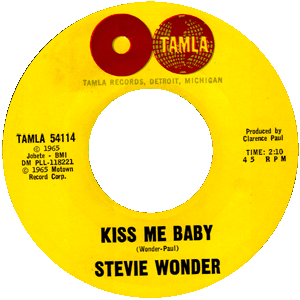Tags
 Tamla T 54114 (A), March 1965
Tamla T 54114 (A), March 1965
b/w Tears In Vain
(Written by Clarence Paul and Stevie Wonder)
 Tamla Motown TMG 505 (A), March 1965
Tamla Motown TMG 505 (A), March 1965
b/w Tears In Vain
(Released in the UK under license through EMI / Tamla Motown)
 Tempting, and legitimate, to ask whether Motown’s patience with Stevie Wonder was running thin by the spring of 1965. It had been six months since his last single, and getting on for two years since his last big hit, Stevie’s releases since then an extremely patchy grab-bag of harmonica freak-out novelties, ill-suited ballads and low-key pop songs. He’d taken a big step towards his future with his last effort, the self-penned Pretty Little Angel (scheduled but probably unreleased – its B-side, Tears In Vain, was dusted off for re-use here) – but Kiss Me Baby sees him reverting to type, the amiable, lunkheaded harmonica prodigy, a ball of energy leaping around on stage and shouting snatches of lyrics. Lookit, ain’t that the dancing blind kid?
Tempting, and legitimate, to ask whether Motown’s patience with Stevie Wonder was running thin by the spring of 1965. It had been six months since his last single, and getting on for two years since his last big hit, Stevie’s releases since then an extremely patchy grab-bag of harmonica freak-out novelties, ill-suited ballads and low-key pop songs. He’d taken a big step towards his future with his last effort, the self-penned Pretty Little Angel (scheduled but probably unreleased – its B-side, Tears In Vain, was dusted off for re-use here) – but Kiss Me Baby sees him reverting to type, the amiable, lunkheaded harmonica prodigy, a ball of energy leaping around on stage and shouting snatches of lyrics. Lookit, ain’t that the dancing blind kid?
And at a stroke, it plunges Stevie right back to square one, and what Nelson George summed up as the worst run of material for any Motown artist. It’s difficult to argue George’s point; I’ve found kind words for many of Stevie’s singles from Fingertips up until now, but quite honestly, if I was told I could never listen to any of them ever again, I’m not sure I’d feel that much of a loss.
What annoys me most about Kiss Me Baby, which isn’t actually a terrible record, is that it feels like Stevie being put – willingly put – back in his box, just as it felt like he was ready to throw the damn thing away. But no, it’s performing monkey time; I’m just not sure who’s meant to be the organ grinder in this analogy.
Motown had had the Contours slog through two years’ worth of tired, endless, increasingly joyless re-runs of Do You Love Me, in the hope of scoring another huge hit, and then in the hope of scoring some more of the diminishing returns which were still at least returns; but what was the motivation for packaging Stevie up as the “remove brain before listening”, good-time harmonica party tween? Back when he was 11, the act had won some points from people who thought he was cute. Doing the same things at almost fifteen? Not so much. He wasn’t harmless ol’ “Little Stevie” any more, doing his adorable tributes to “Uncle Ray”, the onset of puberty bringing a cracked voice and facial hair, but also an unmistakeable hormonal edge which took him out of puppy-love kiddie territory and into adolescent passion; these kisses ain’t for Grandma.
I can sort of see Motown’s motivation for releasing this, an old recording by now, as a single – Stevie had taken to using it as an energetic set-closer, a way to use up any remaining energy either he or the crowd had left in them at the end of a frantic set, the exact role which had originally given us Fingertips back in 1963. But honestly, if you’d told me this was the direct follow-up to Fingertips, I’d not have batted an eyelid.
And that’s the real pity. We’ve had a magnificent run of sides here on Motown Junkies recently, everyone at the company – writers, artists, musicians and producers – constantly upping their game. By shoving out a diverting but ultimately moronic ten-month-old semi-instrumental harmonica jam as Stevie’s new single, it did him a considerable disservice. When everyone else at Motown had made giant, seven-league strides from where they’d been back then, well, on this evidence Stevie was not only failing to keep pace, he was standing stock fucking still as everyone else went zooming by.
His harmonica chops haven’t rusted any, and his demented energy still raises half a smile (maybe a bit more if you’re feeling down and need a pick-me-up), but this is the sound of a young man still very much finding his own groove at this point, and harmonica aside there’s almost literally nothing else to this. Its only really memorable feature is Stevie literally blowing kisses in time with the track, lip-smacking so close to the mic that the sound is unrecognisable as human, never mind being a kiss; he does it completely acapella at the start, in an intro so horrifically irritating I actually skipped right on past it the first few times I listened to The Complete Motown Singles: Volume 5. Beyond that, you could segue between this and Fingertips and barely miss a beat, except that this one quickly gets tiresome.
Not horrible, but dispiriting; Stevie doesn’t sound jaded at all, which somehow makes it worse, like he was keen to live down to the hype. Messy and incoherent, which aren’t necessarily bad things for a pop record, but also directionless and ultimately boring, which definitely are. Far from Stevie’s worst A-side, but yet another disappointing entry in what was fast becoming a disappointing canon; Motown must have wondered if he’d ever land another big hit again.
MOTOWN JUNKIES VERDICT
(I’ve had MY say, now it’s your turn. Agree? Disagree? Leave a comment, or click the thumbs at the bottom there. Dissent is encouraged!)
You’re reading Motown Junkies, an attempt to review every Motown A- and B-side ever released. Click on the “previous” and “next” buttons below to go back and forth through the catalogue, or visit the Master Index for a full list of reviews so far.
(Or maybe you’re only interested in Stevie Wonder? Click for more.)
 |
 |
| The Hit Pack “Let’s Dance” |
The Hillsiders “You Only Pass This Way One Time” |
DISCOVERING MOTOWN |
|---|
Like the blog? Listen to our radio show! |
| Motown Junkies presents the finest Motown cuts, big hits and hard to find classics. Listen to all past episodes here. |


Just listened to this … Agree it is quite dreadful. However, once the Wonder machine gets rolling with “Uptight” it won’t slow down for another dozen or so years. With everything Mr. Wonder is going to release in the coming months/years he will make up for “Kiss Me Baby” & even “Little Water Boy!”
LikeLike
I don’t even think it’s dreadful so much as unnecessary. We already had Fingertips, and if we wanted more of the same only less good, we’ve already had Hey Harmonica Man, and Happy Street, and Workout Stevie Workout, and Monkey Talk, and This Little Girl… and I can’t see the path that leads from here to Where I’m Coming From, never mind Innervisions.
LikeLike
Although I was glad to find a new single of this in 70s, to fill the hole in the Wonder collection, it isn’t a very good record. Not when surrounded to “Nowhere To Run,” ” It’s Growing”, “Stop In The Name of Love,” “Ask The Lonely,” ” Shotgun” … all the juicy goodies by his peers. In addition to being a poor record, it’s not much a song either; it always seemed to me a big rave-up about nothing.
Like “Little Water Boy” everybody involved seemed to want to forget this too. It’s certainly not on 1968’s Greatest Hits, or the 1977, 3-disc Looking Back anthology.
His next single, come August, is the live version of “High Heel Sneakers” from Motortown Revue In Paris, and while it’s not “Uptight,” it’s much more of a signal of the maturity Wonder is about to come into, and I like it a lot more.
LikeLike
I don’t understand how THIS gets it’s own release as the “A” side (no less), when “Tears From A Woman’s Eyes”-Temptations, “I Should have Known Better”-Marvelettes, “Crying In The Night”-Monitors, “Suspicion”-Originals, “Any Girl In Love”-Kim Weston, etc. never get onto plastic, and “A Little More Love”-Kim Weston was pulled back. More strange is that they pulled back the wonderful and beautiful, “Pretty Little Angel” by Stevie, himself (Tamla 54108), his release just before this one. Unbelievable!
LikeLike
They were drunk in the Friday Quality Control Meeting when this got picked for release!
LikeLike
Lmao! Agree
LikeLike
Robb & everyone. Sure agree about this song, but I am sure Motown was a bit perplexed as what to do with Stevie whose voice was changing etc. It was similar with the Jackson 5/Michael Jackson. I mean after the initial J-5 hit singles it was “do we move them onto more mature ballads or give them a couple more ABC’s?”
LikeLike
FYI – this is totally unrelated & won’t appear until light years from now… but I thought some of the last few songs Michael did with Motown (“Happy” & especially “We’re Almost There”) were some of the best things he ever recorded (& that includes “Thriller”!)
LikeLike
Whoa! Grandpa Landini I don’t know about Thriller lol but I agree with both of your statements. The J5 slump is clear on the Skywriter & Lookin’ Through the Windows albums. Michael did record some good solo stuff for Motown. The ones you mentioned plus Dear Michael. Later J5 song I love are “Get it Together” “Don’t Say Goodbye Again” “Moving Violation” and their version of Marvin’s “Pride and Joy” that was left unreleased.
LikeLike
And how about ….. FOREVER CAME TODAY!!!!! love their version of that (and the SUpremes’ original)
LikeLike
This song and anything remotely close to “A-B-C” should never be in the same sentence; they are leagues apart. Motown was continually turning a blind eye to Stevie’s sexuality, and he sang almost nothing about being in love – almost like saying Blind people shouldn’t have those feelings! “Kiss Me Baby” was a frustrating find during my collecting years, “High Heel Sneakers” and even “Happy Street” were more fulfilling by a long shot. Once he began putting pen to paper and started writng his own material, It was off to the races (You could even speculate that he had “Gotten Some” lol). Collecting his singles, he still had me rolling my eyes at times clear up to “Never Had A Dream Come True” – I preferred “I’d Be A Fool Right Now” to “Yester-Me”…All I can say is Thank God for “Signed Sealed Delivered” (No more folk songs). This song gets a “2” from me, and Tears In Vain gets a “1”.
LikeLike
There are many records that I look upon more kindly with age; this isn’t one of them. 3/10.
LikeLike
LMAO! “stock fucking still” has to be my favorite quote from Steve D. up to this point. Nothing that I can really say about this song.
LikeLike
Hee hee. I don’t like cursing too much, especially when it’s gratuitous like that, but goodness me, Stevie.
I’m sorry it’s taken more than a year to get less than a hundred entries on from this one – I thought we’d have covered the redemptive part of Stevie’s mid-Sixties story arc by now, if I’m honest – but we’ll get there yet.
LikeLike
Yes we will!
LikeLike
I love you Stevie, but this is poor. Even by “I Just Called To Say I Love You” standards. Bring on “Uptight”!!
LikeLike